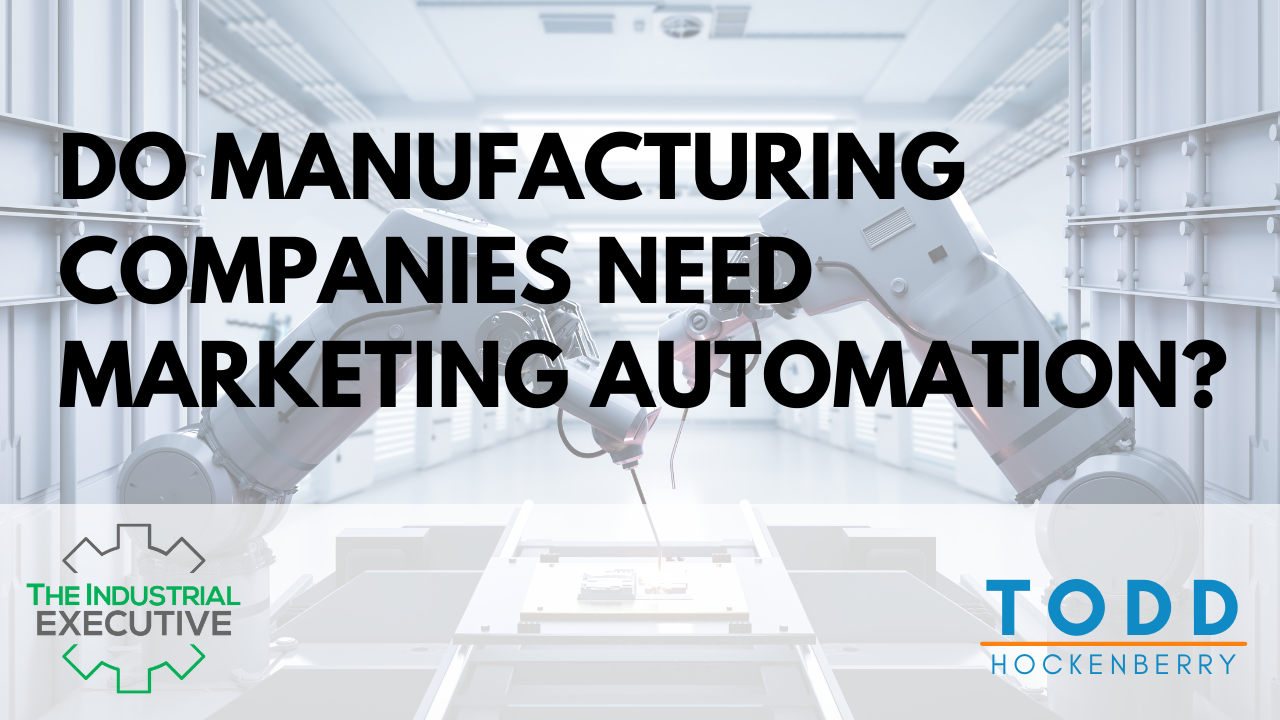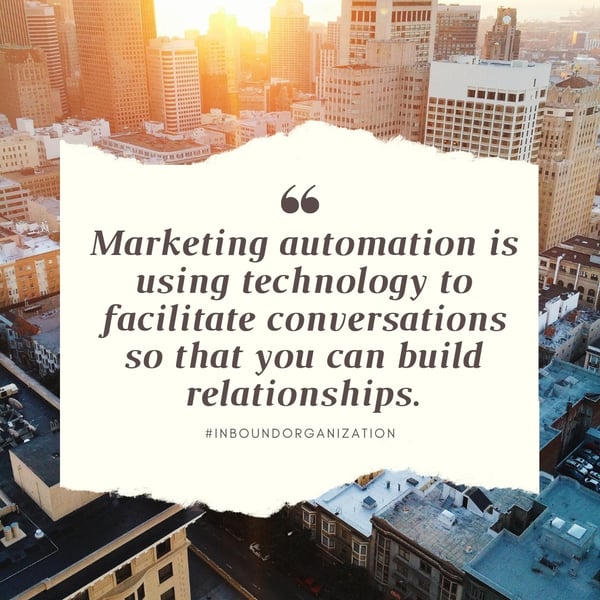Posted by Todd Hockenberry ● Aug 30, 2022
Do Manufacturing Companies Need Marketing Automation?
As a manufacturing business owner or leader, you know the time, effort, and investment it takes to implement ERP and shop-floor automation systems. These tools are required to manage your business and deliver the quality and excellence in production your customers require.
Do you apply the same rigor and effort to developing and using tools to manage the most important asset you have - your customers and contacts?

What is marketing automation, and why do manufacturing companies need it?
Marketing automation is the technology used to facilitate conversations and build relationships with your target audience, leads and prospects, and customers.
Why do manufacturing companies need marketing automation, you ask?
Because your buyers demand it - because modern buyers, and that is all of us, expect it.
In the age of Amazon, Facebook, Google, and Netflix, all of us expect fast, personalized service, great products, and an easy-to-use experience from any company we work with. This includes manufacturing companies.
Our expectations for service mean that every marketing, sales, support, and service person and department must adapt. Marketing automation helps deliver what customers want, including:
- Ease of use
- Speed to value
- Easy to find info
- Personalized experiences
- Relevant context
- Mobile optimized connections and content
If a large portion of the buying process starts online - and they do - then you cannot deliver a great experience without marketing automation. You cannot wait until someone calls you to start helping them. Your website, email campaigns, social media, and any other marketing outreach must be tuned to the searcher and deliver the helpful information they want when they want it. If you wait for the phone to ring, you are going to just be the third quote for comparison and will not be the partner of choice.
Running a manufacturing business without marketing automation tools is like driving at night with no GPS or headlights and expecting to arrive at your desired destination.
What marketing automation tools do manufacturers need?
The goal of marketing automation is a centralized view of the customer. Your marketing tech stack is just as important as your ERP and factory floor automation systems. Key marketing automation tools include:
- Content management system for your website to develop insights into your site visitors and how they interact with and consume your content.
- Email tools to send personalized messages to your contacts and to track views, clicks, and engagement over time.
- Social media and online comment monitoring tools.
- CRM - customer relationship manager to understand and track all of the interactions with your contacts; this must include service and ordering information and then looped back to marketing in order to service/grow the relationship; the goal is closed loop relationship information and tracking.
- Conversational marketing tools like phone call tracking, chat, and chatbots.
- Project management tools to track and manage open projects.
There a many other marketing automation tools available, but these represent the basic technology stack that manufacturing companies need to build to start.
How do you start implementing marketing automation?
First, manufacturing leaders should identify and map the customer relationship value stream using the persona and buyer journey model. This allows the team to identify inefficiencies and build a plan to improve the service process. Essentially, this means you must create a customer management process just like a product design, production, or process.
To map the value stream, you must know whose value stream you are talking about. Just like you map the value stream for a particular product, you need to map it for a particular person. That person is your ideal buyer or target persona. A persona is a specific person your business targets, not the average buyer's generalized demographic profile.
A well-developed persona describes how the buyer goes about the process of adopting something new or stated in another way, changing their processes.
“A persona, if built correctly, goes beyond what I call a persona profile and the buyer’s journey and includes buying insight. It includes the buyer’s voice speaking directly to how, when, and why they make the investment that the company wants buyers to make. The persona tells the company what triggers an investment, what outcomes the buyer expects from that investment, and what their objections are to choosing a company as their investment partner.” Adele Revella, Inbound Organization, Wiley 2018
Manufacturers must understand the buyer’s journey and how their sales process matches it. The goal is to be intentional about building your customer relationship process. With no process, there is no chance to understand how to make it better. And with no marketing automation to deliver data, context, and information, there is no way to see what is actually happening in those relationships.
Next, remove manufacturing leaders must remove silos to information and allow it to flow to all parts of the process, so everyone expected to help has the customer has the correct information and context to do so. Information and value must move smoothly from marketing to sales to service.
We have had this experience. You call a company to resolve an issue, and you are handed from one customer service person to another, each time repeating your name, account number, or other known information - information they already have and that you have repeated to identify yourself. How annoying is that process?
That annoyance you as the customer feel directly results from poorly constructed marketing automation systems. One department cannot smoothly transition the call to another. Customers do not care about your departments but about solving their problems.
A word about marketing. Peter Drucker said that marketing is finding and keeping a customer. Defined this way, marketing encompasses all interactions throughout the lifetime of the customer and all interactions they have with your business.
Manufacturers are taught to make only what is necessary and allow customers to get the information they need when they need it. Marketing automation should allow customers to pull the help they need when they need it.
This process starts with your website. Can customers pull information and value when they need it from your website, and can they get to the right person quickly if they need to?
Get rid of the self-indulgent fluff on your site and build it for your persona - about them, talking to them, with the content they need, not what your designer thinks makes a site look good.
Next, quality process thinking dictates that you then eliminate all waste in the customer relationship process. This means breaking down any roadblocks to communication. Eliminating waste means there are no steps a customer is required to take that do not add value to their experience. Use your marketing automation tools to understand where you are creating friction in the relationship process.
The goal is to Identify inefficiencies in your customer’s experience with your business at every point in the process. Eliminate any waste you find. Remove the roadblocks to communication and a deeper relationship. One of the worst experiences manufacturing companies perpetrate on their contacts is the dreaded automated phone system.
“Please listen to the entire message because our options have recently changed.”
“Enter your contact’s name to find their extension.”
“Click one for accounting, two for sales, etc.”
Does any human being on the planet enjoy this process? Or does it make every single one of us cringe?
Leaders, you hate these systems, yet you allow your manufacturing company to start your communications with prospects and customers with a system YOU KNOW they hate. This is an example of marketing automation done wrong.
Manufacturing company employees must own the customer relationships and share their feedback with leadership in order to facilitate continuous improvement. Companies need to apply at least as much quality system thinking rigor to their customer relationship process as they do to their production process.
You solicit feedback from the shop floor and use it to improve your production process. In the same way, you must ask for feedback from the field. Customer value comes from the relationship you build with them; monitor and improve these relationships like you would your production processes.
Strive for continuous improvement in your interactions with customers like you do on your shop floor.
Manufacturing companies need a strategy, processes, and marketing automation tools to communicate and grow relationships. Modern manufacturing buyers insist on it.
Need a marketing automation refresher? Want to learn more about the basics of automation, like the tools and tech you should be using and how to get started?
Topics: Inbound Organization, Marketing, Manufacturing






